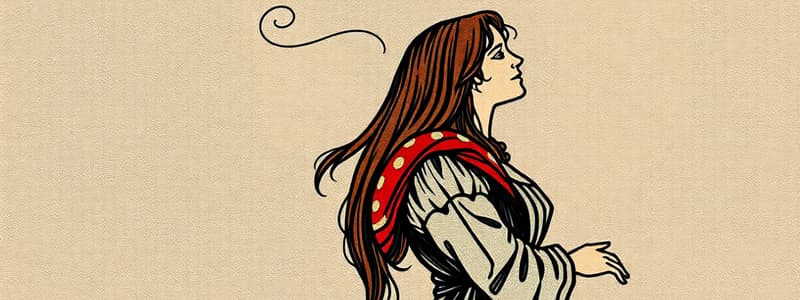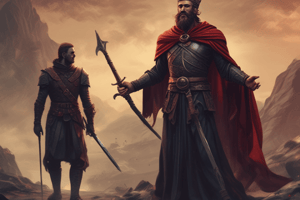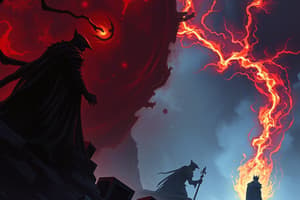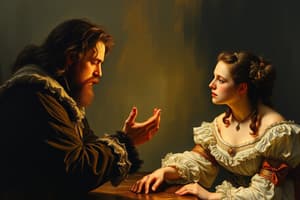Podcast
Questions and Answers
What does the concept of 'star-crossed lovers' imply in 'Romeo and Juliet'?
What does the concept of 'star-crossed lovers' imply in 'Romeo and Juliet'?
- The lovers have total control over their destinies.
- They will eventually overcome all obstacles.
- Their relationship is predetermined by external forces. (correct)
- Their love is purely based on personal choices.
Which action exemplifies the characters' exercise of free will?
Which action exemplifies the characters' exercise of free will?
- The family feud between the Montagues and Capulets.
- Romeo's decision to confront Tybalt. (correct)
- The influence of the prologue on their actions.
- The tragic outcome of their relationship.
How does the missed letter to Romeo contribute to the themes of fate and free will?
How does the missed letter to Romeo contribute to the themes of fate and free will?
- It highlights that personal decisions have no consequences.
- It represents a choice made by Juliet that alters her fate.
- It signifies the control of destiny over the characters' lives. (correct)
- It shows that all events are predetermined and unavoidable.
What philosophical question does 'Romeo and Juliet' raise regarding love and fate?
What philosophical question does 'Romeo and Juliet' raise regarding love and fate?
In the context of 'Romeo and Juliet', how is the struggle between fate and free will depicted?
In the context of 'Romeo and Juliet', how is the struggle between fate and free will depicted?
Flashcards are hidden until you start studying
Study Notes
Fate Vs. Free Will in "Romeo and Juliet"
-
Concept of Fate:
- The play is framed by the notion of "star-crossed lovers," suggesting that Romeo and Juliet are fated to meet and die.
- The characters frequently reference destiny, highlighting the idea that outside forces influence their lives.
- Key moments (e.g., the prologue) indicate that fate controls the tragic outcome.
-
Elements of Free Will:
- Characters make choices that contribute to their downfall, emphasizing personal responsibility.
- Romeo and Juliet deliberately choose to pursue their relationship, defying familial expectations.
- Decisions—such as Romeo's vengeance on Tybalt and Juliet's use of the potion—demonstrate the impact of individual choices.
-
Conflict Between Fate and Free Will:
- The interplay between fate and free will raises questions about whether the characters' actions are preordained or a result of their own decisions.
- Moments of chance (e.g., the missed letter to Romeo) underscore the tension between fate and the consequences of character actions.
- The tragedy reflects the struggle of personal desires against inevitable fate, ultimately leading to catastrophic consequences.
-
Philosophical Implications:
- The play invites audiences to consider whether love can triumph over fate or if the characters are merely pawns of destiny.
- The duality prompts reflection on the role of fate in human life and the extent of individual agency in shaping one's destiny.
Fate in Romeo and Juliet
- The play suggests that Romeo and Juliet are destined to meet and die, as stated in the prologue.
- The characters often reference destiny, highlighting the impact of outside forces on their lives.
- The tragic ending is presented as a predetermined outcome, controlled by fate.
Free Will in Romeo and Juliet
- Despite the presence of fate, characters make decisions that contribute to their downfall.
- Romeo and Juliet’s decision to pursue their relationship, despite familial expectations, demonstrates free will.
- Their individual choices, like Romeo's revenge on Tybalt and Juliet's use of the potion, significantly impact the tragedy.
Fate vs. Free Will in Romeo and Juliet
- The play explores the tension between free will and fate, questioning whether characters' actions are preordained or consequences of their own choices.
- Moments of chance, like the missed letter to Romeo, reinforce this tension.
- The tragedy showcases the struggle between personal desires and inevitable fate, leading to catastrophic consequences.
Philosophical Implications
- The play encourages audiences to consider whether love can prevail over fate or if characters are merely pawns of destiny.
- The duality of fate and free will prompts reflection on the role of fate in human life and the extent of individual agency in shaping one's destiny.
Studying That Suits You
Use AI to generate personalized quizzes and flashcards to suit your learning preferences.




